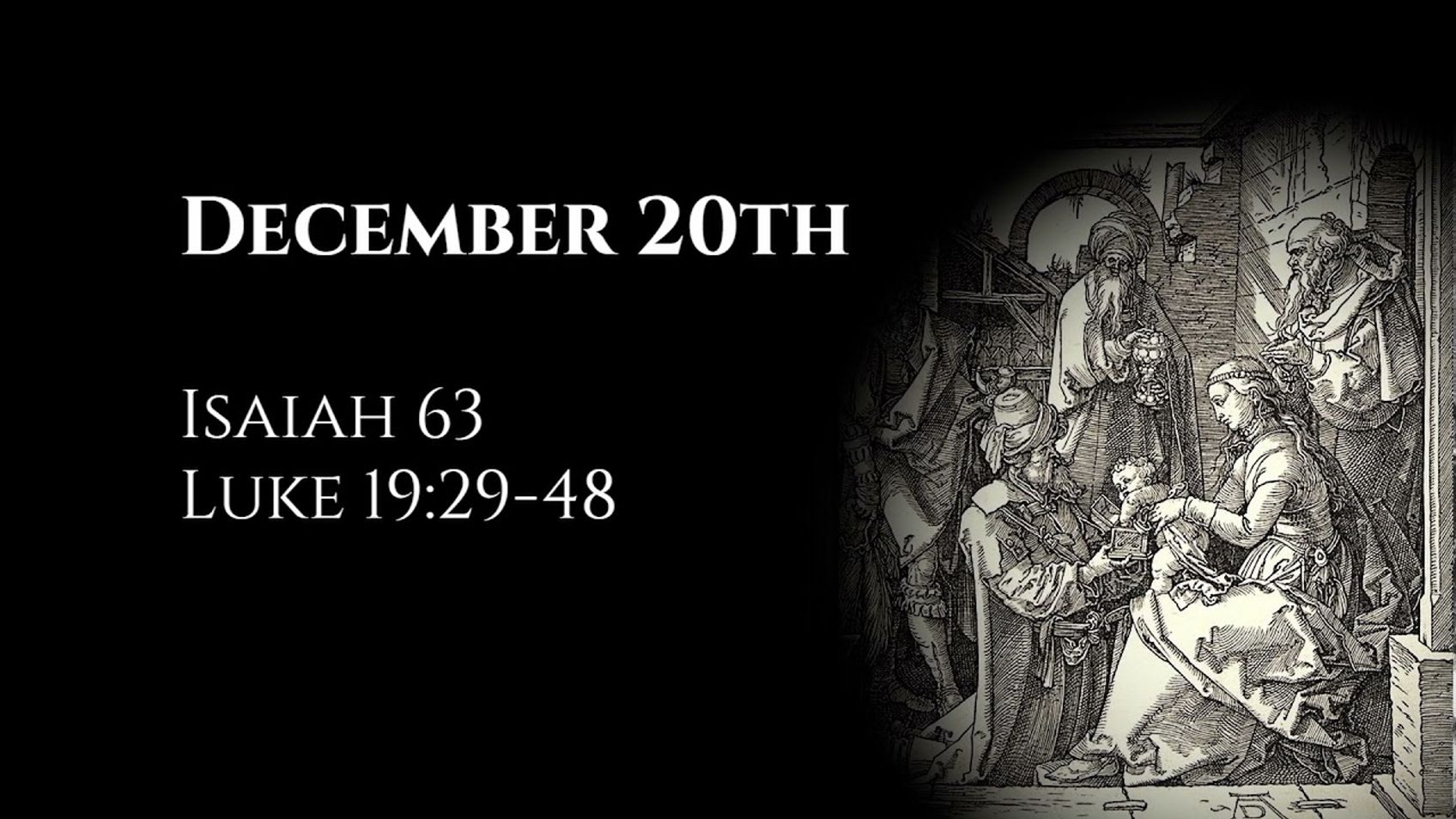December 20th: Isaiah 63 & Luke 19:29-48
December 19, 2021

Alastair Roberts
The Divine Warrior coming from Edom. The Triumphal Entry.
My reflections are searchable by Bible chapter here: https://audio.alastairadversaria.com/explore/.
If you are interested in supporting this project, please consider supporting my work on Patreon (https://www.patreon.com/zugzwanged), using my PayPal account (https://bit.ly/2RLaUcB), or buying books for my research on Amazon (https://www.amazon.co.uk/hz/wishlist/ls/36WVSWCK4X33O?ref_=wl_share).
You can also listen to the audio of these episodes on iTunes: https://itunes.apple.com/gb/podcast/alastairs-adversaria/id1416351035?mt=2.
More From Alastair Roberts
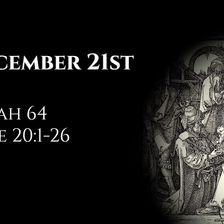
December 21st: Isaiah 64 & Luke 20:1-26
Alastair Roberts
December 20, 2021
Oh that you would rend the heavens and come down! The Parable of the Wicked Tenants.
My reflections are searchable by Bible chapter here: https://aud
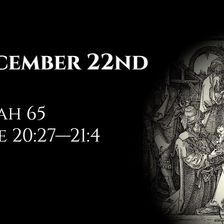
December 22nd: Isaiah 65 & Luke 20:27—21:4
Alastair Roberts
December 21, 2021
A new heavens and a new earth. Jesus challenged by the Sadducees concerning the resurrection.
My reflections are searchable by Bible chapter here: ht
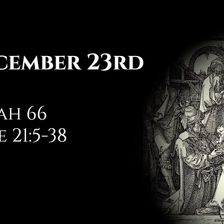
December 23rd: Isaiah 66 & Luke 21:5-38
Alastair Roberts
December 22, 2021
Zion gives birth to a new nation. The Olivet Discourse.
My reflections are searchable by Bible chapter here: https://audio.alastairadversaria.com/exp
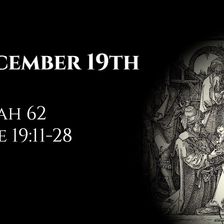
December 19th: Isaiah 62 & Luke 19:11-28
Alastair Roberts
December 18, 2021
Zion restored and renamed. The Parable of the Minas.
My reflections are searchable by Bible chapter here: https://audio.alastairadversaria.com/explor
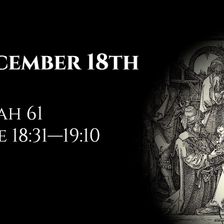
December 18th: Isaiah 61 & Luke 18:31—19:10
Alastair Roberts
December 17, 2021
The Spirit of the Lord is upon me. Jesus in Jericho.
My reflections are searchable by Bible chapter here: https://audio.alastairadversaria.com/explor
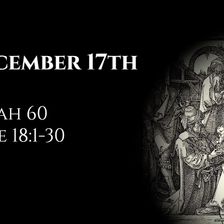
December 17th: Isaiah 60 & Luke 18:1-30
Alastair Roberts
December 16, 2021
Arise, shine, for your light has come! The Parable of the Persistent Widow, the Parable of the Tax Collector and the Pharisee, and the Rich Ruler.
My
More on OpenTheo

How Would You Convince Someone That Evil Exists?
#STRask
November 17, 2025
Questions about how to convince someone that evil exists, whether Charlie Kirk’s murder was part of God’s plan, whether that would mean the murderer d

Did God Create Us So He Wouldn’t Be Alone?
#STRask
November 3, 2025
Questions about whether God created us so he wouldn’t be alone, what he had before us, and a comparison between the Muslim view of God and the Christi

E. Calvin Beisner: Climate and Energy Policy
Knight & Rose Show
January 4, 2026
Wintery Knight and Desert Rose welcome Dr. E. Calvin Beisner to discuss climate and energy policy. They explore Biblical dominion and stewardship, con

Prove to Me That Jesus Is Not a Created Being
#STRask
January 26, 2026
Questions about why we should think Jesus is not a created being, and what it means to say God became fully human if part of being human means not bei

Lora Ries: Border Security and Immigration Policy
Knight & Rose Show
December 7, 2025
Wintery Knight and Desert Rose welcome Lora Ries to discuss border security and immigration policy. They explore Biden's policy changes, like ending R

Are Demon Possessions and Exorcisms in the New Testament Literal?
#STRask
December 11, 2025
Questions about whether references to demon possessions and exorcisms in the New Testament are literal, how to talk to young children about ghosts, an

Life and Ministry in Charlotte and in the SBC with Clint Pressley
Life and Books and Everything
December 15, 2025
In a rare cultural anomaly that may never be repeated in our lifetimes, the current SBC President and current PCA Moderator live in the same neighborh

The Heidelberg Catechism with R. Scott Clark
Life and Books and Everything
November 3, 2025
You may not think you need 1,000 pages on the Heidelberg Catechism, but you do! R. Scott Clark, professor at Westminster Seminary California, has writ

Why Are So Many Christians Condemning LGB People Just Because of How They Love?
#STRask
January 15, 2026
Questions about Christians condemning LGB people just because of how they love, how God can expect someone to be celibate when others are free to marr

Can You Recommend Good Books with More In-Depth Information and Ideas?
#STRask
January 22, 2026
Questions about good books on Christian apologetics, philosophy, and theology with more in-depth information and ideas, and resources to help an intel

Can You Provide Verifiable, Non-Religious Evidence That a Supernatural Jesus Existed?
#STRask
November 10, 2025
Question about providing verifiable, non-religious evidence that a supernatural Jesus existed.
* I am an atheist and militantly anti-god-belief. Ho

Why Would Any Rational Person Have to Use Any Religious Book?
#STRask
December 8, 2025
Questions about why any rational person would have to use any religious book, whether apologetics would be redundant if there were actually a good, un

Is Greg Placing His Faith in the Wrong Thing?
#STRask
February 12, 2026
Questions about Greg placing his faith in his personal assessment of which truth claims best match reality rather than in the revelation of God in Jes

An Invitation to the 2026 Coram Deo Pastors Conference
Life and Books and Everything
February 18, 2026
"I love being a pastor, and I love pastors, which is why I hope you will consider joining us at the Coram Deo Pastors Conference in 2026." —Kevin DeYo

Christmas Cranks and Christmas Blessings with Justin Taylor and Collin Hansen
Life and Books and Everything
December 17, 2025
If you are looking for a podcast where three friends talk about whatever they want to talk about and ramble on about sports, books, and grievances, th
